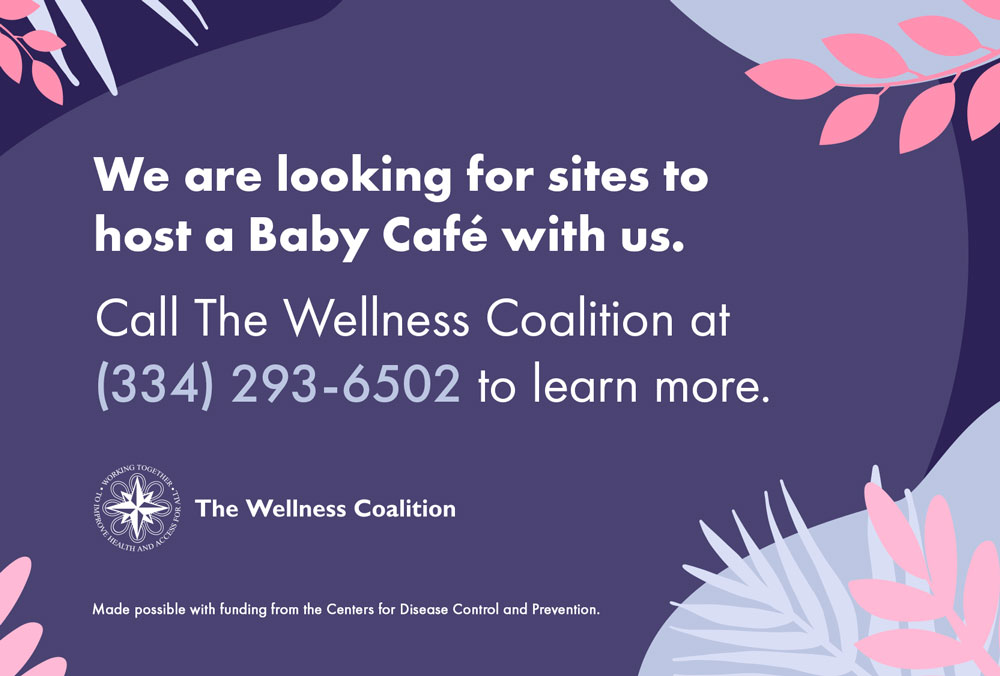The Best Source of Nutrition
Breastfeeding is the best source of nutrition for most infants. It can also reduce the risk for certain health conditions for both infants and mothers. Most mothers want to breastfeed but stop early due to a lack of ongoing support. Certain factors make the difference in whether and how long infants are breastfed. The Wellness Coalition has created a list of free and local resources to help you make breastfeeding a priority for your new baby. Scroll down or click to jump to a topic using the list below:
Breastfeeding Benefits
The American Academy of Pediatrics acknowledges breast milk as the best source of nutrition for newborn infants. It’s recommended that baby is breastfed for the first 6 months of life at a minimum. Thereafter, solid foods may gradually be introduced. However, it’s recommended breastfeeding continue until baby’s first birthday.
Babies who breastfeed have a lower risk of:
- Asthma
- Diabetes (type 2)
- Eczema (a skin disease)
- Gastrointestinal infections (diarrhea/vomiting)
- Infections (ear, respiratory)
- Inflammatory bowel disease
- Necrotizing enterocolitis (NEC) for preterm infantsexternal icon
- Obesity
- Sudden Infant Death Syndrome (SIDS)
Mothers who breastfeed their babies have a lower risk of:
- Breast and ovarian cancers
- Diabetes (type 2)
- High blood pressure
Breastfeeding Resources
WIC Services, Pumping Supplies, and Breastfeeding Counseling (Sign up when pregnant):
COPE Pregnancy Center
2158 Madison Ave, Montgomery, Alabama 36103
(334)-264-9143 | Text: (334)-207-0913
Gateway Family Health Center
2905 East South Blvd, Montgomery, Alabama 36116
(334) 834-5811
Chisholm Family Health Center
100 East Vandiver Blvd, Montgomery, Alabama 36110
(334) 832-4338
Montgomery County Health Department
3060 Mobile Hwy, Montgomery, Alabama 36108
(334) 293-6400
Eastbrook Training Center
401 Coliseum Blvd #A, Montgomery, Alabama 36109
(334) 270-9263
Macon County Health Department
812 Hospital Rd, Tuskegee, Alabama 36083
(334) 727-1800
Lowndes County Health Department
507 E Tuskeena St, Hayneville, Alabama 36040
(334) 548-2564
Breastfeeding Frequently Asked Questions
The Wellness Coalition has partnered with the Centers for Disease Control and Prevention, the Office on Women’s Health, and the Gift of Life Foundation, to provide a list of common questions about breastfeeding, and answers to those questions. Still have questions? Call The Wellness Coalition at (334) 293-6502 to speak with a wellness navigator and to access more local resources.
Breastfeeding is good for both infants and mothers. Breast milk is the best source of nutrition for most infants. As an infant grows, breast milk changes to meet the baby’s nutritional needs. Breastfed babies are less likely to get ear infections, die of Sudden Infant Death Syndrome (SIDS), and be obese in childhood. Breastfeeding moms lower their risk of developing hypertension, diabetes (type 2), and cancer and are more likely to lose weight gained during pregnancy.
Any amount of breastfeeding is good for both baby and mother. The American Academy of Pediatrics recommends that infants be exclusively breastfed for the first 6 months. For the following 6 months of life, continued breastfeeding is recommended along with the introduction of other foods.
Although many medications do pass into breast milk, most have little or no effect on milk supply or on infant well-being. Few medications are not recommended while breastfeeding.
Yes. Breastfeeding is not a sure way to prevent pregnancy, even though it can delay the return of normal ovulation and menstrual cycles. Ask a doctor or nurse about birth control choices that are okay to use while breastfeeding.
For those who smoke, the best thing they can do for themselves and their baby is to quit. If this or smoking less is not possible, it is still better to breastfeed and keep breastfeeding. Smoking away from your baby and changing clothes to keep your baby away from the chemicals that smoking leaves behind are good practices.
An occasional drink is fine, but the American Academy of Pediatrics recommends waiting two hours or more before nursing. Drugs such as cocaine, heroin, marijuana, and PCP should not be used because they pose harmful consequences for infant development.
Breastfeeding in Private or Public Spaces
Code of Alabama 1975: Section 22-1-13 states that a mother may breastfeed her child in any location, public or private, where the mother is otherwise authorized to be present. (Act 2006-526, p. 1222, §1.)
Break Time at Work for Nursing Mothers
The Federal Break Time for Nursing Mothers Law (as updated by PUMP Act) states that an employer shall provide:
- A reasonable break time for an employee to express breast milk for her nursing child for 1 year after the child’s birth each time such employee has need to express the milk; and
- A place, other than a bathroom, that is shielded from view and free from intrusion from coworkers and the public, which may be used by an employee to express breast milk.
Fair Labor Standards Act: 29 U.S.C. § 218(d)
This law applies to all employers, regardless of size. Employers with fewer than 50 employees who can show that providing break time or space to pump may cause an undue hardship may be exempted under the law. Employees may have additional rights to receive break time, space, and accommodations at work under the Pregnant Workers Fairness Act starting June 27, 2023.
Human milk banks are a service established for the purpose of collecting milk from donors and processing, screening, storing, and distributing donated milk to meet the specific needs of individuals for whom human milk is prescribed by licensed health care providers. When possible, human milk banks also serve healthy infants who have been adopted or are not able to get their own mother’s milk.
She can follow these steps offered by the Office on Women’s Health and check with her healthcare provider or a lactation counselor if these don’t help:
- Make sure the baby is latched on and positioned well.
- Breastfeed often and let your baby decide when to end the feeding.
- Offer both breasts at each feeding. Have your baby stay at the first breast as long as he or she is still sucking and swallowing. Offer the second breast when your baby slows down or stops.
- Avoid giving your baby formula or cereal in addition to breast milk, especially in the first 6 months of life. Your baby may lose interest in your breast milk, and your milk supply will decrease. If you need to supplement your baby’s feedings with more milk, try using a spoon, cup, or a dropper filled with pumped breast milk.
Breastfeeding Webinar Series
Breastfeeding Summit 2024 – Part 1
Breastfeeding Summit 2024 – Part 2
Breast Milk and the Body: Amplify Breastfeeding Voices for Impact
Breastfeeding: What Are Your Goals?
All Hands on Deck for Breastfeeding: Multifaceted Community Support
Black Moms Do Breastfeed
Latching On To Breastfeeding Support
Overcoming Barriers to Breastfeeding
Breastfeeding Myths
Made possible with funding from the Centers for Disease Control and Prevention.



 400 Taylor Rd, Montgomery, Alabama 36117
400 Taylor Rd, Montgomery, Alabama 36117  1348 Carmichael Way, Montgomery, Alabama 36106
1348 Carmichael Way, Montgomery, Alabama 36106
 7150 Halcyon Park Drive, Montgomery, Alabama 36117
7150 Halcyon Park Drive, Montgomery, Alabama 36117